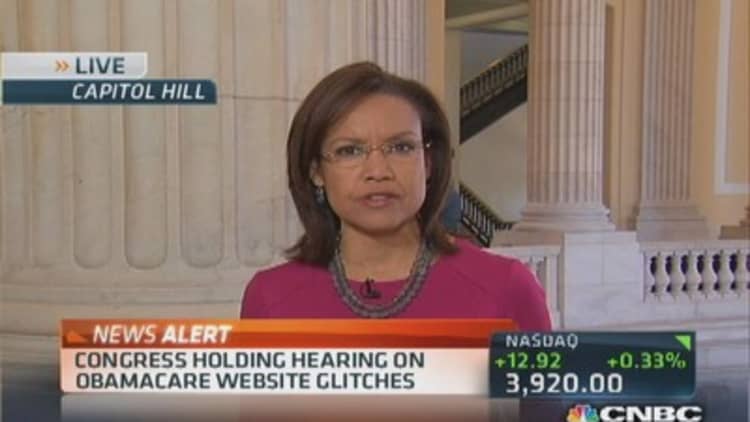The federal agency responsible for HealthCare.gov refused to say Thursday whether top officials had warned Health and Human Services Secretary Kathleen Sebelius that last-minute testing had revealed problems before the site launched Oct. 1.
Conducting its first media conference call to provide updates on site fixes, the agency also brushed aside a question about whether a top technology official was directly responsible for the decision to prohibit window-shopping for insurance plans on the site before people applied.
(Read more: )
A contractor on Thursday told a congressional committee that she believed Henry Chao, an official with the Centers for Medicare and Medicaid Services (CMS), had made that call. It has been blamed for contributing to significant slowdowns on the Obamacare marketplace.
A lack of thorough testing was also cited. Contractors said they would have preferred "months" of testing rather than the week or so they had before the debut of HealthCare.gov.
"We don't want to look back," CMS spokeswoman Julie Bataille said at the start of the conference call.
The agency wanted to concentrate on steps being taken to correct problems and on the fact that there are more than five months for people to enroll in Obamacare coverage, she said, adding that a "compressed time frame" to the launch date had precluded more extensive testing.
"The focus of our work is on what we want to do right," said Bataille, who also said she was confident the fixes would let people enroll for coverage beginning Jan. 1.
(Read more: Contractors vow quick fix of Obamacare Web problems)
But Sebelius will have a tougher time dismissing questions concerning what and when she knew about prelaunch issues when she testifies before Congress next week. Republicans hostile to the Affordable Care Act, or Obamacare, have been demanding answers to those questions.

Bataille, whose agency is a division of HHS, provided a series of statistics to support her claim that millions of Americans want to buy insurance on the Obamacare exchanges.
She noted that "nearly 700,000 applications for coverage have been submitted across the nation" on both the federally run HealthCare.gov site and in the 16 marketplaces run by individual states.
But when asked how many people had actually enrolled in coverage from HealthCare.gov, which is selling insurance to residents in 36 states, Bataille said, "I don't have that exact information." She said CMS would release enrollment information next month.
Industry experts have told CNBC.com that they believe the level of enrollments from the federal marketplace is very low, which is a function of the difficulty people continue to have logging on, creating accounts and reviewing different plans.
When asked if Chao had made the decision in September to force contractors to prevent site visitors from looking at plans before they created accounts, Bataille avoided answering directly.
"We had to make business decisions," she said. It is one of several times she used the term "business decision" as a rationale for that move.
The reporter who asked about Chao also asked Bataille whether CMS chief Marilyn Tavenner "or anyone else" had told Sebelius about HealthCare.gov's problems before the launch.
(Read more: Insurers meet at White House on Healthcare.gov tech mess)
Bataille didn't answer that question, either, and an assistant cut off the reporter when she tried to press the point. Tavenner is scheduled to testify before Congress next week.
When another reporter repeated the question about Sebelius minutes later, Bataille demurred again, saying, "So, obviously, I don't think anybody was able to predict the consumer demand that we saw on Oct. 1."
CMS and HHS have, since the launch date, consistently cited the high number of visitors as a main reason why HealthCare.gov locked up and was unable to handle the traffic. But tech experts have noted that other consumer sites routinely handle much higher levels of traffic, and noted that the Obamacare marketplace has continued to have software issues even after traffic subsided.
(Read more: GOP's expert on Obamacare? Ex-fugitive McAfee)
A survey of 2,047 people Monday by the online market research firm uSamp found that 77 percent of respondents had been unable to log on or to create an account on HealthCare.gov or one of the other state-run marketplaces. The remaining 23 percent had been successful.
"I knew something wasn't right when I tried to log on and was told the site was too busy," one of the survey's respondents told uSamp.
—By CNBC's Dan Mangan. Follow him on Twitter @_DanMangan


